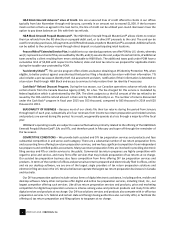HR Block 2015 Annual Report Download - page 21
Download and view the complete annual report
Please find page 21 of the 2015 HR Block annual report below. You can navigate through the pages in the report by either clicking on the pages listed below, or by using the keyword search tool below to find specific information within the annual report.
14 2015 Form 10-K | H&R Block, Inc.
viruses and worms, malicious code, phishing attacks, denial of service attacks, or information security breaches, other
negative disruptions to the operation of the internet, and natural disasters. Any failure or interruption in our
information systems, or information systems of our franchisees or a private or government third party on which we
rely, or an interruption in the internet or other critical business capability, could negatively impact our business
operations and increase our risk of loss. As our businesses are seasonal, our systems must be capable of processing
high volumes during our peak periods. Therefore, service interruptions resulting from system or internet failures could
negatively impact our ability to serve our clients, which in turn could have a material adverse effect on our business
and our consolidated financial position, results of operations, and cash flows.
There can be no assurance that system or internet failures, or interruptions in critical business capabilities will not
occur, or if they do occur that we, our franchisees or the private or governmental third parties on whom we rely, will
adequately address them. The precautionary measures that we have implemented to avoid systems outages and to
minimize the effects of any data or communication systems interruptions or failures may not be adequate, and we
may not have anticipated or addressed all of the potential events that could threaten or undermine our information
systems or other critical business capabilities. The occurrence of any systems or internet failure, or business
interruption, could negatively impact our ability to serve our clients, which in turn could have a material adverse effect
on our business and our consolidated financial position, results of operations, and cash flows.
Government initiatives that simplify tax return preparation or expedite refunds could reduce the need for our
services as a third-party tax return preparer, and cause our revenues or results of operations to decline.
Many taxpayers seek assistance from paid tax return preparers such as us not only because of the level of complexity
involved in the tax return preparation and filing process, but also because of paid tax return preparers' ability to
expedite refund proceeds under certain circumstances. From time to time, the IRS or members of Congress propose
measures seeking to simplify the preparation and filing of federal tax returns, including preparation of tax returns
directly by the IRS, and to provide additional assistance with respect to preparing and filing such tax returns or
expediting refunds. H&R Block is a member of the FFA, which provides the ability for low-income taxpayers to prepare
and file their own federal tax return online for free. The IRS has been exploring the Real Time Tax System concept,
which would require that documents (such as W-2s and 1099s) must be on file with the IRS prior to the taxpayer
submitting their tax return. The objective of this concept would be to facilitate document matching such that it would
reduce fraud and after-the-fact audits. The implementation of the Real Time Tax System would provide a foundation
for the IRS preparation of tax returns and make the pre-populated return a more tangible possibility.
In 2011, the U.S. Department of the Treasury completed a prepaid debit card pilot program designed to facilitate
the refund process. HRB Bank also provides this type of service through its H&R Block Emerald Prepaid MasterCard®.
Additionally, the IRS has in the past explored the possibility of allowing taxpayers to allocate a portion of their tax
refund to pay tax preparation fees, which could reduce the demand for RTs, but the IRS has not advanced this initiative.
Taxing authorities in various state, local, and foreign jurisdictions in which we operate have also introduced measures
seeking to simplify the preparation and filing of tax returns in their respective jurisdictions. The adoption or expansion
of any measures that significantly simplify tax return preparation, expedite refunds, or otherwise reduce the need for
a third-party tax return preparer could reduce demand for our services and products and could have a material adverse
effect on our business and our consolidated financial position, results of operations and cash flows.
Federal Reserve capital regulations impose various requirements and restrict our capital allocation strategies and
we are therefore pursuing a strategy which would cause our Holding Companies to cease being SLHCs. If our Holding
Companies were to cease being SLHCs, the means we use to deliver financial services and products to our customers
and the revenues and profitability of those offerings could be adversely impacted.
Our subsidiary, HRB Bank, is a federal savings bank. Our Holding Companies are SLHCs because they control HRB Bank.
The Dodd-Frank Act requires the Federal Reserve to promulgate minimum capital requirements for SLHCs, including
leverage and risk-based capital requirements that are no less stringent than those applicable to insured depository
institutions at the time the Dodd-Frank Act was enacted. On July 2, 2013, the Federal Reserve approved the Basel III
Capital Rules, which implement a revised definition of regulatory capital, a new common equity tier 1 minimum capital
requirement, and a higher minimum tier 1 capital requirement (Revised Capital Rules). The rule also requires certain
levels of equity for the payment of dividends and bonuses, and amends the methodologies for risk-weighting assets.
























